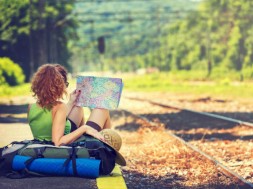Solo travel has certain inherent risks but none of these risks should prevent someone from traveling, it just requires a certain amount of planning, awareness and confidence. Please find below some tips on travel safety as a solo female.
Prior preparation and planning
Researching your destination is vital and time spent researching is never wasted. Study the culture and get a general feel for the country. Is it a Muslim country? If yes, then think about what to pack, how to dress and how to blend in. Does the country have strict laws on how a female should ‘behave’? We may not agree with their views but it is extremely important to be seen to follow them to avoid trouble. Does the country have a culture of ‘hassling’ females, is there a history of sexual attacks, all these things and more prior research will identify. With that knowledge you can then plan to adapt to the environment. For example, many female travelers have decided to dye their hair black prior to traveling around India. Research identified that Blonde women get a lot more attention in India and therefore were at greater risk of hassle.
Interact with fellow travelers
When one is traveling alone, very little time is actually spent alone unless so desired. There will always be people traveling the same ‘route’ or solo travelers in the same hostel or accommodation. Friendships are made and bonds formed in the mutual interests of travel and adventure. These ‘friendships’ are great for safety, other people watching out for you, other people to travel with, share taxis and buses with. Should you trust people you just meet? No, ones situational awareness should never be dropped, but be open to fellow travelers and interact. Perhaps pass names and details of your new contacts onto people back home if you are traveling with new friends, just on case. Benefit from this interaction but don’t open yourself to unnecessary danger.
Lose the jewelry
Try and avoid shiny or expensive looking jewelry and accessories. Nice watches, bracelets, necklaces and alike should be avoided. The same goes with top of the range phones, laptops and cameras.
Be Grey
Please read our being grey for travel safety article. The link is at the bottom of the page.
Plan routes
Whether you are coming home from a bar or from the beach. Think about what route you will take. The author was in Cambodia and needed to assist a young girl after she was sexually attacked walking back from the beach, she had unfortunately decided to take a short cut past an army barracks. Avoid quiet areas, alleyways or other perceived areas of risk. Always think about using a taxi and make sure it is from a reputable company that you have been recommended.
Don’t be misinterpreted
Sometimes it is necessary to think about what signals you may be giving off and ensure they are not interpreted incorrectly. Try avoiding prolonged eye contact with strangers, chatting excessively and being ‘overly’ friendly. For example, sitting in the front seat of a taxi and having a good chin wag with the driver on a way back from a bar may give the wrong signals. If you are eating alone, maybe take a book with you so as not to invite conversation.
This is not about whether you were flirting or not, it is not about whether a woman should have to curtail her normal daily practice of smiling, talking freely and just being happy. It is about being grey and not drawing too much unwanted attention. It is not for us to discuss the rights and wrongs of culture and practices in certain countries and regions, merely to adapt and decrease risk to ourselves.
Follow your gut
The trick to avoiding danger is to pre-empt situations and allow yourself time to react. This comes down to training and practice, we strongly advocate learning from professionals about how to identify risk and react accordingly, but a good rule of thumb is: Follow your instinct. If something feels wrong, there is a good chance it is wrong. React immediately to ensure your safety and worry about whether you were right or wrong later, when you are a 100% safe.
Pre-empt and envisage
The majority of women do not have the strength or speed of men. This is not sexist it is just a general rule of nature. Therefore we advise women that to survive situations they must pre-empt dangers, allowing time to react and then envisage their actions, allowing an effective response. What do we mean by this?
Let us use a nightclub fire as an example. In times of life and death, chivalry has been proven to 9 times out of 10 fly out the window. Panic sets in and a stampede effect can occur. If men and women are panicking, rushing to the one main exit that everyone had come in from, then men will by majority overpower women and the inevitable crushing and trampling will occur. What if the female had taken 2 minutes to pre-empt a risk and envisage an effective response. In this case identified secondary fire exits and envisaged using them in an emergency and without light or vision. She may have even checked the doors, looked to see what route she would use to get there. Through these actions, whilst everyone was stampeding for the main doors she would have been able to utilize a secondary exit and ensure her survival through forethought and planning, not strength and speed.
Situational Awareness
Being aware of ones surroundings is of vital importance to identify threats early. This is why we teach basic anti-surveillance to all our students. Criminals and predators may stalk their prey for a short time prior to an attack to allow the best opportunity to strike. Other predators may stalk their prey for hours, days or weeks just trying to find the opportunity. With increased observational skills and awareness, chances of spotting an attack or threat are increased significantly and allow a person time to react. This is also useful in avoiding pick-pockets, muggers, opportunistic criminals and many other dangers.
Hotel and accommodation security
Choose accommodations wisely, research areas and travel forums. Is it a well managed hotel or hostel? Is it in a nice area? Does it have good security? This does not mean stay in a 5 star hotel everywhere, it can mean spending a few dollars more to be in a reputable area but still in a backpacker hostel. When you travel we advise carrying a secondary door lock ($5 worth and small enough to put in your pocket) to provide a secondary layer of security. Never opening a door unless 100% certain.
All the above are just tips. I have traveled extensively throughout my life and am still learning tricks of the trade and how to handle situations. This is why we have developed our travel safety courses. Professionals from all walks of life train constantly to ensure they are prepared. We believe it should be the same for travelers, take the time to learn how to look after yourself and your friends. Travel is one of the greatest things we will do in our lives, it is worth preparing accordingly to make sure you make the greatest of memories for all the right reasons.





